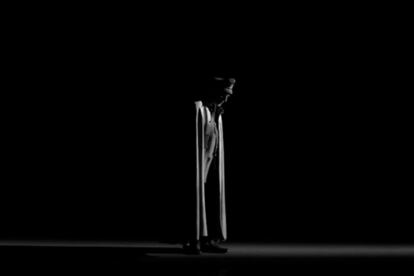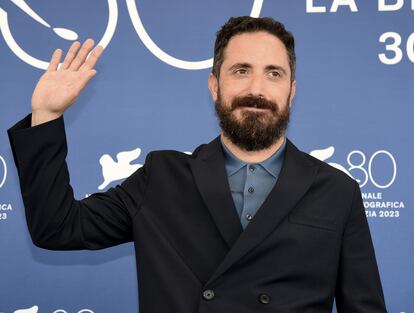Pinochet returns as a vampire to astonish the Venice Film Festival
Pablo Larraín’s ‘El Conde’ achieves the difficult feat of building a satire around the dictator and his impact on modern-day Chile without trivializing him or forgetting his atrocities

Augusto Pinochet is still alive. He is 250 years old, and he is a vampire.
Impossible. Absurd. It could only happen in El Conde [The Count]. That is, in a movie.
Augusto Pinochet led a dictatorship that, between 1973 and 1990, murdered at least 3,000 citizens, tortured and exiled many more, annihilated the political opposition and denied rights, imposed neoliberalism on his country and stole and embezzled money from the State he swore to protect. And he never went to jail.
Impossible. Absurd. It must be the product of the same film. But everything in the movie comes from the reports and court decisions on which Pablo Larraín based many of the lines in his feature film, which premiered this Thursday at the Venice Film Festival.
In the end, even the dictator’s immortality is partly true. For the filmmaker, Pinochet is still alive in the Constitution he approved, which is still in effect; in the big businessmen who benefited from and defended him; in the legacy of individualism, inequality, “little mutual compassion” and “greed” that has infected his fellow countrymen; in the divisiveness he still causes in Chilean public debate. According to the director, that had never appeared in a feature film before. Perhaps only Larraín could break that taboo. And only he could do it like this. That’s because he is one of Chile’s most respected and celebrated filmmakers. It’s also because the film is part of Larraín’s cinematic journey, which has already addressed Pinochet in No and Post-mortem. Larraín is a visionary and daring talent, so much so that he made a film about pedophile priests, The Club. And now, he is portraying the dictator in a political satire about vampires… and getting away with it, to boot.
“Some will think it’s too soon. But my conscience is clear. The worst thing the film could do would be to fall into trivialization, empathy, simplification. That would be unforgivable. The limit was always to look at him as a symbol of evil, whose actions and intentions sought to do harm,” the filmmaker told EL PAÍS. In fact, Larraín has been thinking about the project for years. One impetus was the advanced age of the actor that he’d always imagined in the role, Jaime Vadell. But the long wait has meant that El Conde is premiering exactly 50 years after the September 11, 1973, coup d’état in which Pinochet bombed the presidential palace in Santiago and forcibly seized power from Salvador Allende. In addition, the film’s debut comes as Chile is experiencing a turbulent political moment due to the possible approval of a new constitution. The film will be shown in select theaters beginning on the 7th of September and premiere on Netflix on the 15th.
The filmmaker — who “joyfully” voted for Chile’s current president, leftist Gabriel Boric — admits that he is unsure about what to expect. He believes there are two unmovable audiences: on the one hand, the dictator’s “sycophants” and, on the other hand, those who believe that a film cannot and should not depict something so serious. Larraín hopes to reach viewers in the middle who are “willing to see a film that shows how unbelievable impunity made Pinochet eternal.” But those who give El Conde a chance will be rewarded with much more: a world, an atmosphere, an intention, a stamp, ambition, intelligent dialogue, beautiful black and white photography. In a nutshell: viewers will be treated to auteur cinema.

Because the film gradually builds a universe as surreal as it is coherent, laughs come with shivers and the farce is steeped in reality. In the film, everything is possible, both the delusions invented by the script and those that really happened. And then there’s a mixture of both: the sequences of a caped Pinochet flying over the country at night in search of prey evoke the daily life that the dictator has never left, as does the character’s enduring love of heart milkshakes. At the same time, as the director emphasizes, the film alludes to the typical iconography of vampires; the character is even a superhero in reverse. And, curiously, the Venice Film Festival happens to be screening three other films that also focus on bloodsuckers. El Conde doesn’t do the other movies any favors, both because of how challenging it is and because of the high bar it sets.
Aware of the sensitivity of the subject matter, Larraín speaks slowly and weighs his words carefully. At one point, he goes back: he said “avarice,” but he prefers the word “greed” instead. And so on. Because, despite the fact that the dictator died on December 10, 2006, Pinochet is everywhere. He was present two days ago in the suicide of Hernán Chacón Soto, 86, one of the seven ex-military men convicted for the murder of singer-songwriter Víctor Jara during the dictatorship. And, of course, he was there in the 2022 failure of the reform to Pinochet’s Constitution, which is now being attempted for a second time, led by a right-wing majority amid the citizenry’s growing distrust and disinterest, according to polls.
‘I killed hundreds of Reds, and they accuse me of stealing’
“They are ungrateful,” the dictator complains in the film. He also laments the insistence of that “Spanish judge” [Baltasar Garzón], who tried so hard to make him pay for his crimes and nearly succeeded. That’s not so different from what the real Pinochet said in 1998, when he had to step down from leading the Chilean armed forces: “Over these past 65 years, no desire has motivated my professional and personal life more forcefully than that of making my dedication to service coincide with the Fatherland’s major objectives and interests.”
“I killed hundreds of Reds, and they accuse me of stealing. That’s how they humiliate me,” Pinochet adds. It’s for that very reason that the vampire has finally decided to die. Nobody understands him anymore, not even his own relatives, who have flocked to him like vultures. They are worried about Dad, of course. But they are more concerned about all the money he will leave behind. Perhaps the plot is the film’s weak spot, both because of its flaws and because of the original idea: it is so good that it swallows everything else up. The other questionable choice is having the narrator’s voice in English: although the script justifies that decision, it suggests a ploy to market the film more easily around the world.

And that’s what it’s all about. Last year, right here in Venice, Santiago Mitre’s Argentina, 1985 reckoned with the trial of the Jorge Videla-led military dictatorship. That was the first time that a film dared to narrate that episode. But someone always has to go first, as was the case of filming parodies that imagined the return of Mussolini or Hitler in Italy or Germany. Of course, some countries condemned or repudiated their dictators. Chile did not. “The trauma stems from the lack of justice. If Pinochet had been imprisoned, his legacy would be very different,” Larraín reflects. And he continues: “I was clear on three things. First of all, his character and his violence were non-negotiable. Second, the understanding that one of the most serious things is that his excesses toward savage capitalism also gave rise to a lack of understanding among us. And third, [Pinochet’s] most invisible legacy [is that] 70% of Chileans live on less than €800 [$868.12] a month, [which is] one of the highest rates of inequality on the continent.”
The interview is over, but Larraín asks for a few more minutes. He does not want to leave any concept half-finished. “It’s important,” he warns. Larraín then quotes Julio Cortázar: “There is only one way to kill monsters: accept them.” Otherwise, they become eternal.
Sign up for our weekly newsletter to get more English-language news coverage from EL PAÍS USA Edition
Tu suscripción se está usando en otro dispositivo
¿Quieres añadir otro usuario a tu suscripción?
Si continúas leyendo en este dispositivo, no se podrá leer en el otro.
FlechaTu suscripción se está usando en otro dispositivo y solo puedes acceder a EL PAÍS desde un dispositivo a la vez.
Si quieres compartir tu cuenta, cambia tu suscripción a la modalidad Premium, así podrás añadir otro usuario. Cada uno accederá con su propia cuenta de email, lo que os permitirá personalizar vuestra experiencia en EL PAÍS.
¿Tienes una suscripción de empresa? Accede aquí para contratar más cuentas.
En el caso de no saber quién está usando tu cuenta, te recomendamos cambiar tu contraseña aquí.
Si decides continuar compartiendo tu cuenta, este mensaje se mostrará en tu dispositivo y en el de la otra persona que está usando tu cuenta de forma indefinida, afectando a tu experiencia de lectura. Puedes consultar aquí los términos y condiciones de la suscripción digital.









































